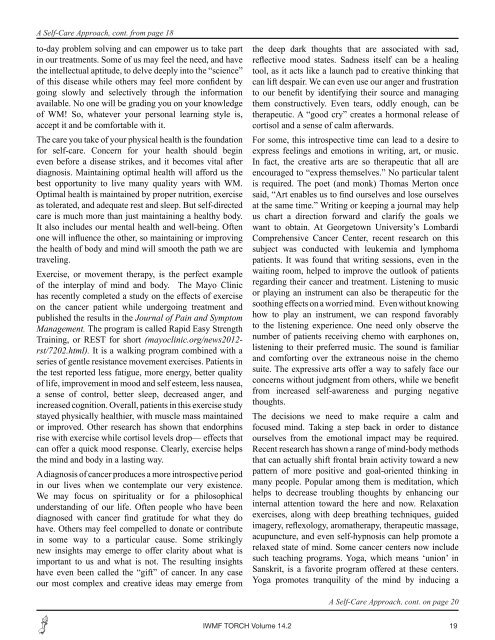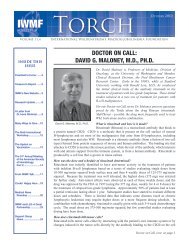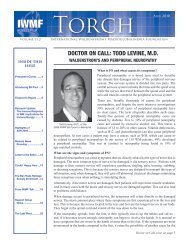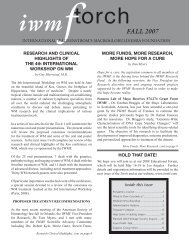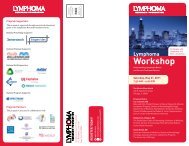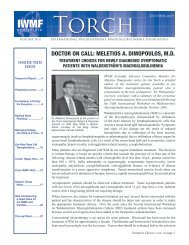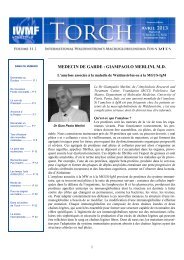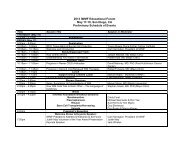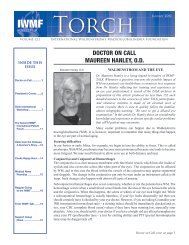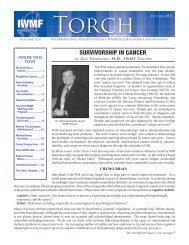English - International Waldenstrom's Macroglobulinemia Foundation
English - International Waldenstrom's Macroglobulinemia Foundation
English - International Waldenstrom's Macroglobulinemia Foundation
You also want an ePaper? Increase the reach of your titles
YUMPU automatically turns print PDFs into web optimized ePapers that Google loves.
A Self-Care Approach, cont. from page 18<br />
to-day problem solving and can empower us to take part<br />
in our treatments. Some of us may feel the need, and have<br />
the intellectual aptitude, to delve deeply into the “science”<br />
of this disease while others may feel more confident by<br />
going slowly and selectively through the information<br />
available. No one will be grading you on your knowledge<br />
of WM! So, whatever your personal learning style is,<br />
accept it and be comfortable with it.<br />
The care you take of your physical health is the foundation<br />
for self-care. Concern for your health should begin<br />
even before a disease strikes, and it becomes vital after<br />
diagnosis. Maintaining optimal health will afford us the<br />
best opportunity to live many quality years with WM.<br />
Optimal health is maintained by proper nutrition, exercise<br />
as tolerated, and adequate rest and sleep. But self-directed<br />
care is much more than just maintaining a healthy body.<br />
It also includes our mental health and well-being. Often<br />
one will influence the other, so maintaining or improving<br />
the health of body and mind will smooth the path we are<br />
traveling.<br />
Exercise, or movement therapy, is the perfect example<br />
of the interplay of mind and body. The Mayo Clinic<br />
has recently completed a study on the effects of exercise<br />
on the cancer patient while undergoing treatment and<br />
published the results in the Journal of Pain and Symptom<br />
Management. The program is called Rapid Easy Strength<br />
Training, or REST for short (mayoclinic.org/news2012-<br />
rst/7202.html). It is a walking program combined with a<br />
series of gentle resistance movement exercises. Patients in<br />
the test reported less fatigue, more energy, better quality<br />
of life, improvement in mood and self esteem, less nausea,<br />
a sense of control, better sleep, decreased anger, and<br />
increased cognition. Overall, patients in this exercise study<br />
stayed physically healthier, with muscle mass maintained<br />
or improved. Other research has shown that endorphins<br />
rise with exercise while cortisol levels drop–– effects that<br />
can offer a quick mood response. Clearly, exercise helps<br />
the mind and body in a lasting way.<br />
A diagnosis of cancer produces a more introspective period<br />
in our lives when we contemplate our very existence.<br />
We may focus on spirituality or for a philosophical<br />
understanding of our life. Often people who have been<br />
diagnosed with cancer find gratitude for what they do<br />
have. Others may feel compelled to donate or contribute<br />
in some way to a particular cause. Some strikingly<br />
new insights may emerge to offer clarity about what is<br />
important to us and what is not. The resulting insights<br />
have even been called the “gift” of cancer. In any case<br />
our most complex and creative ideas may emerge from<br />
the deep dark thoughts that are associated with sad,<br />
reflective mood states. Sadness itself can be a healing<br />
tool, as it acts like a launch pad to creative thinking that<br />
can lift despair. We can even use our anger and frustration<br />
to our benefit by identifying their source and managing<br />
them constructively. Even tears, oddly enough, can be<br />
therapeutic. A “good cry” creates a hormonal release of<br />
cortisol and a sense of calm afterwards.<br />
For some, this introspective time can lead to a desire to<br />
express feelings and emotions in writing, art, or music.<br />
In fact, the creative arts are so therapeutic that all are<br />
encouraged to “express themselves.” No particular talent<br />
is required. The poet (and monk) Thomas Merton once<br />
said, “Art enables us to find ourselves and lose ourselves<br />
at the same time.” Writing or keeping a journal may help<br />
us chart a direction forward and clarify the goals we<br />
want to obtain. At Georgetown University’s Lombardi<br />
Comprehensive Cancer Center, recent research on this<br />
subject was conducted with leukemia and lymphoma<br />
patients. It was found that writing sessions, even in the<br />
waiting room, helped to improve the outlook of patients<br />
regarding their cancer and treatment. Listening to music<br />
or playing an instrument can also be therapeutic for the<br />
soothing effects on a worried mind. Even without knowing<br />
how to play an instrument, we can respond favorably<br />
to the listening experience. One need only observe the<br />
number of patients receiving chemo with earphones on,<br />
listening to their preferred music. The sound is familiar<br />
and comforting over the extraneous noise in the chemo<br />
suite. The expressive arts offer a way to safely face our<br />
concerns without judgment from others, while we benefit<br />
from increased self-awareness and purging negative<br />
thoughts.<br />
The decisions we need to make require a calm and<br />
focused mind. Taking a step back in order to distance<br />
ourselves from the emotional impact may be required.<br />
Recent research has shown a range of mind-body methods<br />
that can actually shift frontal brain activity toward a new<br />
pattern of more positive and goal-oriented thinking in<br />
many people. Popular among them is meditation, which<br />
helps to decrease troubling thoughts by enhancing our<br />
internal attention toward the here and now. Relaxation<br />
exercises, along with deep breathing techniques, guided<br />
imagery, reflexology, aromatherapy, therapeutic massage,<br />
acupuncture, and even self-hypnosis can help promote a<br />
relaxed state of mind. Some cancer centers now include<br />
such teaching programs. Yoga, which means ‘union’ in<br />
Sanskrit, is a favorite program offered at these centers.<br />
Yoga promotes tranquility of the mind by inducing a<br />
A Self-Care Approach, cont. on page 20<br />
IWMF TORCH Volume 14.2<br />
19


